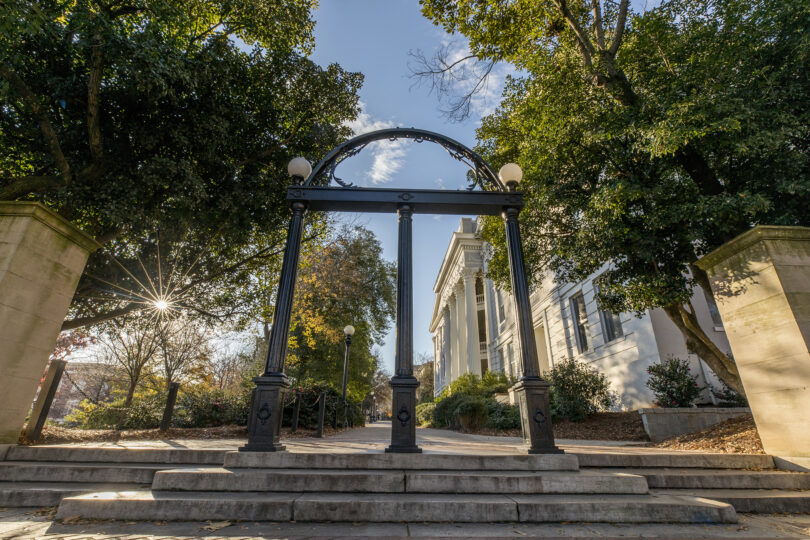The University of Georgia’s Office of Faculty Affairs has expanded its leadership programming to include the Advanced Leader Program for faculty who have held a titled leadership role for one or more years. The selective ALP focuses on key leadership competencies through half-day retreats, engagement with senior administrators, individual and group coaching and leadership projects.
The ALP is the third leadership cohort program in OFA’s progression, beginning with the Emerging Leader Program, followed by the New Leader Program and capped with the ALP. The program expands opportunities for seasoned leaders to pursue professional development and augments the university’s existing Women’s Leadership Fellows and Southeastern Conference Academic Leadership Development programs.
“We are delighted to offer this opportunity for seasoned leaders at the university to enhance their leadership skills and perspectives,” said Elizabeth Weeks, associate provost for faculty affairs. “The Office of Faculty Affairs and its director of programming, Mary Carney, designed a robust, state-of-the-art program. We cannot imagine more talented, thoughtful initial cohorts to launch the ALP.”
The Advanced Leader Program runs on a calendar-year basis. In 2023, its inaugural year, the ALP cohort included six faculty leaders. The second group began in January 2024 with seven faculty leaders.
2024 Advanced Leader Program Cohort
Duc Do, assistant dean for student affairs, College of Pharmacy. Prior to joining UGA in 2017, Do was the interim associate dean for student affairs and associate professor of pharmaceutical sciences in the College of Pharmacy at Chicago State University. His leadership in the UGA College of Pharmacy was recently recognized by INSIGHT into Diversity with a 2023 Inspiring Program in STEM Award. His research focus includes work in the scholarship of teaching and learning related to admissions, academic support services and leadership development for student pharmacists.
Lucy Ingram, professor and head of the department of health promotion and behavior, College of Public Health. Before joining UGA, Ingram served as assistant dean (2018-2021) and associate dean (2021-2023) for academic affairs and online education in the Arnold School of Public Health at the University of South Carolina. Her research focuses on racial and ethnic health disparities, sexual and reproductive health, community-engaged approaches to research and building infrastructure to promote health disparities research.
Hilda Kurtz, professor and head of the department of geography, Franklin College of Arts and Sciences. She was a fellow in the Women’s Leadership Fellows Program 2021-2022 cohort. Her research has centered on the geographic dimensions of political practice with attention to how groups of activists draw on a geographical imagination to strategize for social change. She is interested in how people understand and draw on geographical relationships to argue for inclusion in a diverse and inclusive polity, in formal political and legal arenas as well as in the arena of public opinion.
Orion Mowbray, professor and associate dean for research, School of Social Work. Since joining the University of Georgia in 2013, Mowbray has established a track record of research and training funding in the areas of promoting access to mental health services and understanding differential outcomes associated with mental health services utilization from the National Institutes of Health, the Bureau of Justice Assistance, the Health Resources and Services Administration and Substance Abuse and Mental Health Services Administration.
Allison Nealy, clinical professor and department head of language and literacy education, Mary Frances Early College of Education. Nealy was a fellow in the 2022-2023 Women’s Leadership Fellows Program and is currently a fellow in the Transformative Teaching Fellows Program. Her areas of interest include disability law and policy, inclusive education, trauma-informed practices and preservice teacher preparation. She was the recipient of her college’s 2023 Unsung Hero Award, given to someone who puts service to others over self.
Peter O’Connell, associate professor of classics and communication studies and head of the department of communication studies, Franklin College of Arts and Sciences. He received the Sandy Beaver Excellence in Teaching Award in 2023. He was an Andrew W. Mellon Fellow in the Humanities at Stanford University. He has been a fellow of UGA’s Willson Center for Humanities and Arts and of the Center for Hellenic Studies in Washington, D.C. His research areas include ancient rhetoric and poetics, Greek literature and the relationship between rhetoric and accounting.
Michael Toews, professor and assistant dean of the UGA Tifton Campus, College of Agricultural and Environmental Sciences. He previously co-directed the Center for Invasive Species and Ecosystem Health. As a research entomologist, he focuses on applied insect ecology, invasive species biology and cotton pest management. He has secured over $16 million in competitive grant funding. He was recognized as a 2015 Southeastern Branch recipient of the Entomological Society of America Award for Excellence in Integrated Pest Management.
2023 Advanced Leader Program Cohort
Robert Bringolf, professor in the Warnell School of Forestry and Natural Resources. He previously served as UGA’s associate vice president for instruction and associate dean for academic affairs for the Warnell School of Forestry and Natural Resources. His research interests include aquaponics, endocrine disruption in fish exposed to agrochemicals, factors and effects associated with intersex in fish and effects of pollutants on early life stages of freshwater mussels.
John Drake, Regent’s Professor and founding director of the Center for the Ecology of Infectious Diseases in the Odum School of Ecology. Drake previously served as associate dean for academic affairs in the Odum School from 2017 to 2021. He was also a founding director of the Population Biology of Infectious Diseases Research Experiences for Undergraduates site. His research focuses on the spillover of zoonotic pathogens into humans, global patterns in disease emergence and the use of computer models and data analytics for pandemic preparedness.
Adam Goodie, professor and head of the department of psychology, Franklin College of Arts and Sciences and director of the Georgia Gambling and Decision Lab. Goodie previously served as undergraduate coordinator (2009-2017) and associate head (2017-2021) in the department of psychology, and as graduate coordinator for the Master of Science in artificial intelligence program (2016-2021). He directs the Georgia Gambling and Decision Lab, where he investigates decision making under uncertainty including aspects of control, personality, leadership, human-robot interactions, gambling behavior and gambling problems.
Philip Hong, professor and dean, School of Social Work. Prior to joining UGA, Hong served on faculty at Saint Louis University for three years and Loyola University Chicago for 16 years. Hong was awarded the Lucian and Carol Welch Matusak Professorship at LUC’s School of Social Work where he also served as the director of the doctoral program and the associate dean for research. He is a faculty associate of the Center for Social Development at Washington University in St. Louis. His research interests include international social development, empowerment-based community practice, social policy and nonprofit programs.
Amanda Murdie, Regents’ Professor and Georgia Athletic Association Professor of International Affairs and head of the department of international affairs, School of Public and International Affairs. She is the past editor-in-chief of International Studies Review and co-editor of the University of Georgia Press Studies in Security and International Affairs Book Series. She previously served as the graduate coordinator for the department from 2016 to 2018. She was the 2023 recipient of the International Studies Association’s Karl Deutsch Award that recognizes significant contributions to the study of international relations and peace research. Murdie’s research focuses on human security, conflict and non-state actors.
Pejman Rohani, Regents’ Professor, Georgia Athletic Association Professor of Ecology and Infectious Diseases and associate dean for academic affairs in the Odum School of Ecology and deputy director of the Center for Influenza Disease and Emergence Research. He is a 2007 winner of a Guggenheim Fellowship and is an American Association for the Advancement of Science Fellow and an Ecological Society of America Fellow. His research is focused on computational methods to understand the population biology of infectious diseases including influenza, pertussis and COVID-19. He has co-authored a book on modeling infectious diseases and co-edited a volume on pertussis.
To learn more, visit https://provost.uga.edu/faculty-affairs/Faculty_and_Leadership_Development/Leadership_Development/advancedleaderprogram/.








